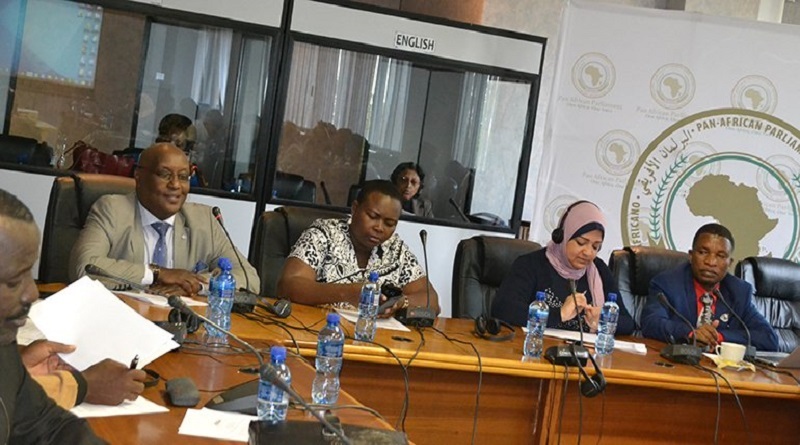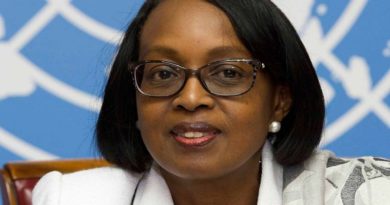Groups train Pan-African Parliamentarians on climate information
Legislators at the Pan African Parliament (PAP) are eager to seek accountability by industrialised countries, whose activities have resulted in excess emission of greenhouse gasses that are causing global warming, but the African civil society on climate change has a different message.
These were some of the ideas at a training for Pan-African Parliamentarians conducted by the African Climate Policy Centre (ACPC) in collaboration with the Pan-African Climate Justice Alliance (PACJA) and the African Climate Legislative Initiative (ACLI) on uptake and use of climate information services (CIS) by vulnerable communities. The event convened at the PAP in Midrand, South Africa on the 10th March 2018 was attended by 31 members of parliament drawn from across the continent.
The training event was organized under the Pan-African component of the Weather and Climate Information Services for Africa (WISER) programme, which is implemented by ACPC. Mr. Frank Rutabingwa, the WISER coordinator at ACPC, informed participants that the objective of WISER is to contribute to enhancement of the policy and enabling environment for increased application of CIS in development planning.
Speaking at the event, participants recalled that the Paris Agreement on climate change calls for international interventions to hold the increase in the global average temperature to well below 2°C above pre-industrial levels and pursuing efforts to limit the temperature increase to 1.5°C.
According to Mithika Mwenda, the PACJA Secretary General, there is urgent need for legislators to work hand in hand with the civil society and researchers for climate adaptation and in advancing the climate discourse at the global level.
“We all need to embrace the Talanoa dialogue introduced in the UN Climate negotiation process,” said Mithika. The purpose of Talanoa is to share stories, ideas, skills, experiences, build empathy and to facilitate wiser decisions for the collective good.
Amongin Jacquiline, the Chairperson of the PAP Committee on Rural Economy, Agriculture, Natural resources and Environment agreed with Mithika, saying that the Talanoa dialogue will help in stock taking of the achievements so far, as well as the challenges, which should inform the way Africa should engage in global climate negotiations.
In addition, Augustine Njamnshi, a board member of the Pan African Climate Justice Alliance (PACJA) noted that “The changing climatic conditions is a problem all over Africa, and the first thing we must do, is accept that there is a problem that must be tackled immediately before pursuing those who caused it”.
A Kenyan study commissioned by the International Development Research Centre (IDRC) Canada and the UK Department for International Development (DFID), and conducted by scientists from the Kenya Markets Trust (KMT) through a project known as Pathways to Resilience in Semi-arid Economies (PRISE), reveals that cattle population in the country has reduced by over 26% between 1977 and 2016.
“Our projections show that temperature is going to increase even further in the coming years, and the impact is likely going to be more devastating,” said Dr Mohammed Said, one of the PRISE researchers.
During the training, the lead trainer, Stephen Mutimba pointed out that the African continent, especially Sub-Saharan Africa, is exposed to climate variability and extremes at frequencies which exceed normal thresholds, and that such events could significantly erode gains already made in poverty reduction. There is therefore need for different countries to devise coping mechanisms so as to save livelihoods.
The trainer also underscored that governments can only prepare for disasters that may result from the extreme weather events only if they have access to adequate climate information.“Climate information and services are key resources for governments and communities to prepare for these changes and when well integrated into policy and practice, they can help reverse this trend and enhance cross-sectoral climate resilient development,” he told the legislators.
Studies have shown that Africa is highly vulnerable to climate change, especially in water, agriculture, forestry, and coastal development sectors, while the World Food Programme estimates that about 650 million people live in arid or semi-arid areas where floods and droughts impact lives and productivity.
In the arable land areas in Sub-Saharan Africa, scientists say that there will be a decrease of 19% in maize yields, and 68% for bean yields. As a result, severe child stunting (leading to higher mortality risk) could increase by 31%–55% across the region by 2050 due to climate change.“The earlier we start tackling the challenge of climate change therefore, the better for our continent,” said Njamnshi.
The ACPC and PACJA committed to continue the engagement with both PAP and ACLI in order to further strengthen awareness and catalyse action on CIS application in development through robust policies and plans.
PAMACC News




